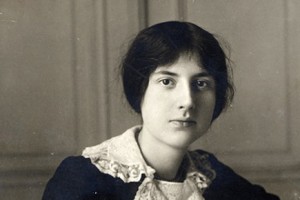I was thrilled to learn that a long-lost work by Lili Boulanger will finally receive its premiere on Thursday, February 26.
The Royal College of Music will present the work at the Royal Festival Hall. The Philharmonia Orchestra’s website provides more information as to its origin from scholar Caroline Potter:
In her all too brief career, Lili Boulanger composed a number of works that have not survived. One missing piece, Marche gaie, resurfaced in short-score form in 2011 in a private collection in North Carolina; the owners of the manuscript are the grandchildren of the work’s dedicatee, Jeanne Leygues. As Marche gaie was registered with the French copyright society SACEM as a work for chamber orchestra in 1916, we can assume it was composed in that year. While the manuscript is in an unknown hand, there is musical and circumstantial evidence that shows beyond reasonable doubt that this is a missing work by Lili Boulanger. The piece has been orchestrated in appropriate style by Robert Orledge.
Jeanne Leygues, daughter of the French politician Georges Leygues (briefly Prime Minister in 1920-21 and a great supporter of the arts), married an American, Paul Rockwell, who fought with his brother in the French Foreign Legion in the First World War. We can assume that Marche gaie was composed for their wedding in December 1916, not least because the piece alludes to Mendelssohn’s famous Wedding March; Lili Boulanger was fond of quotation and allusion. Marche gaie was originally paired with a Marche funèbre, a work yet to resurface.
This is a great discovery – and I have my fingers crossed that Marche funèbre and other works will be found, performed, and recorded. What a fabulous addition to the repertoire!
Marche gaie will be heard along with Ravel and Stravinsky as part of the “City of Light: Paris 1900-1950” Festival. More information and tickets are available here.

